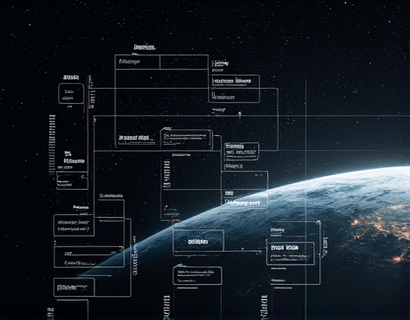Real-Time Government Data: Empowering Citizens and Enhancing Civic Participation Through Open Access and Accountability
In the digital age, the accessibility of government data has become a cornerstone of transparent and accountable governance. Real-time government data offers an unprecedented opportunity to bridge the gap between citizens and their government, fostering a more informed and engaged citizenry. This article delves into the transformative impact of real-time data access on governance, highlighting how open data initiatives are revolutionizing civic participation and enhancing accountability in democratic processes.
The concept of open government data is rooted in the principle that information should be freely available to the public, without restrictions or barriers. By making government data accessible in real-time, authorities can demonstrate their commitment to transparency and responsiveness. This openness not only builds trust but also empowers citizens to make informed decisions, participate actively in public discourse, and hold officials accountable for their actions.
Enhancing Civic Engagement
Real-time government data plays a pivotal role in enhancing civic engagement by providing citizens with timely and relevant information. When data is accessible and understandable, citizens can better assess the performance of their government, identify areas needing improvement, and take informed action. This engagement can manifest in various forms, from participating in online forums and surveys to attending public meetings and contributing to policy discussions.
For instance, real-time data on public spending can help citizens track how tax dollars are being allocated and spent. This transparency allows for more effective oversight and can lead to more efficient and effective use of public resources. Similarly, access to real-time data on environmental quality, public health, and safety can enable citizens to make informed choices about their well-being and advocate for policies that protect their communities.
Promoting Accountability
Accountability is a fundamental pillar of democratic governance, and real-time government data is a powerful tool in this regard. By making government operations and decisions visible to the public, authorities are compelled to act with integrity and responsibility. Real-time data can expose inefficiencies, corruption, and mismanagement, prompting swift action to rectify issues.
Moreover, real-time data facilitates the creation of performance metrics and benchmarks, allowing for objective assessments of government performance. Citizens and watchdog organizations can use this data to monitor progress, evaluate policies, and demand accountability. This continuous feedback loop ensures that government actions align with public expectations and needs.
Technological Enablers
The realization of real-time government data relies on advanced technological infrastructure. Modern information systems, cloud computing, and data analytics tools enable the collection, processing, and dissemination of data at unprecedented speeds. These technologies not only ensure data accuracy and reliability but also enhance the user experience by providing intuitive interfaces and accessible formats.
Open data platforms, often built using web technologies, serve as central repositories for government data. These platforms use APIs (Application Programming Interfaces) to allow developers and citizens to access and utilize data seamlessly. By standardizing data formats and protocols, these platforms foster innovation and collaboration, enabling third-party applications and services that add value to raw government data.
Case Studies: Successful Implementations
Several countries and cities have successfully implemented real-time government data initiatives, demonstrating their positive impact on civic engagement and accountability. For example, the city of New York launched NYC OpenData, a comprehensive platform offering a wide range of datasets on topics such as budget, crime, and public health. This initiative has empowered citizens to analyze data, create informative visualizations, and engage in meaningful discussions about city policies.
Similarly, the UK's Data.gov.uk provides a wealth of government data, fostering a vibrant ecosystem of developers and innovators. Projects built on this data have led to improved public services, enhanced transparency, and increased citizen participation. These success stories underscore the potential of real-time government data to transform governance and strengthen democratic processes.
Challenges and Solutions
Despite the numerous benefits, the implementation of real-time government data initiatives faces several challenges. Data quality and consistency are critical issues, as inaccurate or incomplete data can mislead citizens and undermine trust. To address this, governments must invest in robust data governance frameworks, ensuring data is collected, maintained, and published with high standards of accuracy and reliability.
Another challenge is the digital divide, where certain segments of the population may lack access to the internet or the skills to utilize online data platforms. To bridge this gap, governments should prioritize digital inclusion initiatives, providing access to technology and digital literacy programs. Additionally, multilingual support and user-friendly interfaces can make data more accessible to a broader audience.
Future Prospects
The future of real-time government data is promising, with ongoing advancements in technology and increasing public demand for transparency. The integration of artificial intelligence and machine learning can enhance data analysis and provide deeper insights, enabling more informed decision-making. Blockchain technology, with its inherent transparency and security features, can further bolster data integrity and trust in government operations.
As more governments adopt open data practices, the global community can benefit from shared best practices and collaborative efforts. International organizations and networks can play a crucial role in promoting standards and fostering cooperation, ensuring that the benefits of real-time government data are realized worldwide.
In conclusion, real-time government data is a powerful tool for empowering citizens and enhancing civic participation. By providing transparent and accessible information, governments can build trust, foster accountability, and create a more collaborative and responsive democratic system. Embracing open data is not just a technological imperative but a moral and civic responsibility, essential for the health and vitality of modern democracies.










































